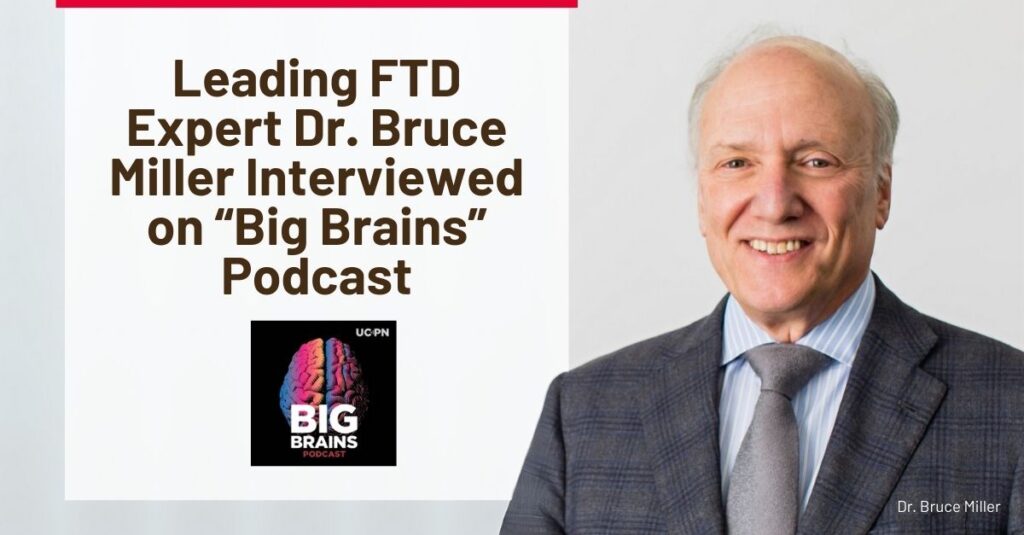Leading FTD Expert Dr. Bruce Miller Interviewed on “Big Brains” Podcast

Bruce Miller, MD, was a recent guest of the University of Chicago podcast “Big Brains,” sharing his experiences observing people with FTD. He discussed the need for a new way to look at behavioral issues, and the importance of keeping our “social brain” healthy.
Dr. Miller is a leading expert in FTD; he is a distinguished professor of neurology at the University of California, San Francisco (UCSF), a member emeritus of AFTD’s Medical Advisory Council, and the recipient of the Susan Newhouse & Si Newhouse Award of Hope at AFTD’s Hope Rising Benefit in 2024.
Dr. Miller, also the director of UCSF’s Memory and Aging Center, is the co-author, with Virginia Sturm, PhD, of the new book Mysteries of the Social Brain: Understanding Human Behavior Through Science.
He said that most people associate neurodegeneration with older-onset memory loss, and early-onset behavioral issues with psychological disorders. A paradigm shift is necessary, he said, to account for the changes common to behavioral variant FTD, which may present in someone’s 40s or even earlier—and which are often seen as a psychological issue, not related to specific brain circuits.
“When you see a dramatic change in someone’s personality or behavior in mid- or late life, you should assume that the brain is changing,” he said. What Dr. Miller calls the “social brain” is the portion of the brain responsible for “our abilities to talk with, relate to, sometimes soothe and heal other people.” Degeneration of these abilities is a hallmark of behavioral variant FTD—the most common FTD subtype.
In his book he describes many cases in which his patients’ sudden personality changes were first interpreted as psychological. One patient suddenly became inexplicably cruel to her family and caregiver, to the point of throwing coffee in her husband’s face. Another seemed indifferent to his wife’s severe hand injury, stopping to chat with a neighbor before taking her to the hospital. In these and similar cases, family and doctors looked first for psychological causes, but neurological examinations showed deterioration in the social brain.
Dr. Miller also noted that about 40% of people with behavioral variant FTD commit antisocial acts that can result in arrest. “It shows you that we don’t entirely have free will,” he suggested.
Asked how families and friends can help, Dr. Miller emphasized the importance of explaining that the new behaviors, whether apathy, antisocial behavior, impulsivity, or poor decision-making, are not anyone’s fault. Another important step is to protect family assets. “For every patient I see, probably half have lost very significant amounts of their resources due to bad decision-making.”
While researchers work to develop a cure or treatment for FTD, Dr. Miller described studies suggesting benefits to sustained social interaction.
“Social engagement, even [with genetic FTD], is associated with less likelihood of the disease happening at a young age. So I think we’re starting to believe that cognitive stimulation, exercise, and social engagement are all important” in delaying the onset of behavioral FTD, he said.
By Category
Our Newsletters
Stay Informed
Sign up now and stay on top of the latest with our newsletter, event alerts, and more…
